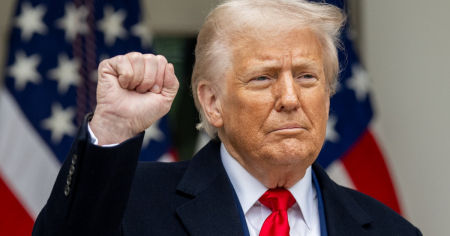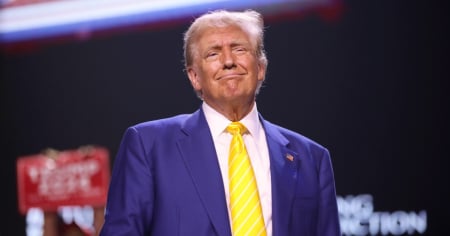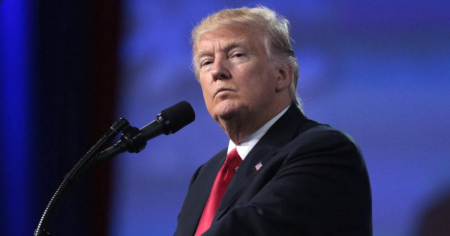The president of the United States, Donald Trump, stated that he was open to reducing his tariffs if other nations could offer something "phenomenal," indicating that the White House was willing to negotiate amidst a drop of up to 14% in the stock market.
Trump, in conversations with reporters this Thursday from Air Force One, strongly defended his tariff program despite the stock market crash, stating that he was happy that interest rates were falling and believed that the economic turbulence would subside.
The official stated that he would be willing to renegotiate "if someone said they would provide something phenomenal, as long as we are receiving something beneficial in return."
On April 2, Trump announced a minimum tariff of 10% on imports to the U.S., with a significantly higher tax rate for certain products from countries like India, China, and the European Union.
In his statements this Thursday, he made it clear that the tariffs protect the U.S. and are a strategic negotiation tool in trade discussions.
In his opinion, tariffs give "great power to negotiate": "All countries have called us." "The rest of the world wants to see if there's a way to reach an agreement," referenced The Financial Times.
His comments came after several White House officials insisted that the newly announced reciprocal tariffs were non-negotiable.
However, the stock markets experienced one of their worst moments following the imposition of tariffs. The S&P 500 plummeted by nearly 5%,
The Russell 2000 index, which tracks the smallest companies, extended its decline to 20% from its peak in 2021, raising concerns that Trump's trade war could strain the U.S. economy.
This Wednesday, Trump announced a 25% tariff on all foreign-made cars and indicated that his administration will impose a general 10% tariff on all imports from any country, although he clarified that it will be higher for those that, in his view, take the most advantage of the United States.
In that group, he included the European Union, which would be subjected to a 20% tax. He also stated that his trade policy would not only protect jobs but would transform the U.S. into “richer than any other country.”
Trump's new tariffs could lead to an increase in the costs of imported goods, affecting consumers and businesses that rely on these products. Analysts warn of a potential inflationary impact and a slowdown in economic growth in the U.S., as well as diplomatic tensions with trade partners. However, financial markets initially reacted with optimism to the announcement.
Frequently Asked Questions about Trump’s New Tariffs and Their Economic Impact
Why has Trump decided to impose new tariffs?
Trump has decided to impose new tariffs with the aim of protecting the American economy and reducing the trade deficit. The measure also seeks to pressure other countries to take action against drug trafficking and illegal immigration. According to Trump, tariffs are a strategic negotiating tool to encourage more favorable trade agreements for the United States.
What impact have the new tariffs had on Wall Street?
The new tariffs from Trump have caused a significant drop in Wall Street, with a decline of up to 14% in the stock market. The S&P 500 index plummeted by almost 5%, erasing 2.5 trillion dollars in market value, which has raised fears of a potential economic recession in the United States. These movements have marked one of the worst times for the stock markets since the COVID-19 pandemic.
Which nations are most affected by Trump's new tariffs?
Among the nations most affected by Trump's new tariffs are China, the European Union, Mexico, and Canada. China will face a tariff of 34%, while the European Union will incur a levy of 20%. Mexico and Canada will see tariffs of 25% on their products exported to the United States. These tariffs aim to balance trade fees and address security and migration concerns.
How has the international market responded to Trump's tariffs?
The international market has reacted with uncertainty and declines in Asian and European stock exchanges following Trump's announcement of new tariffs. The tariffs have heightened global trade tensions, which could lead to retaliation from other countries and a potential trade war. Furthermore, there is concern about the inflationary impact and the slowdown in economic growth in the United States due to the increase in the costs of imported goods.
Filed under:






